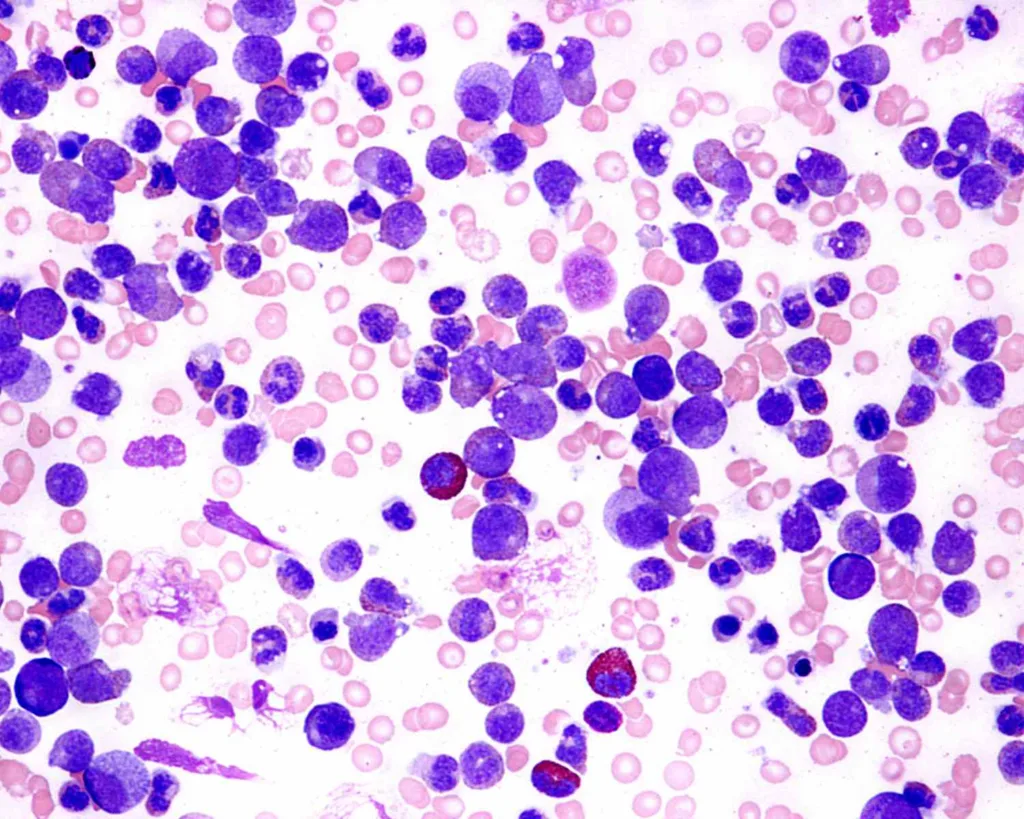Immature granulocytes (IG) are a type of white blood cell that are produced in the bone marrow and are involved in the body’s immune response. In healthy individuals, the level of IG in peripheral blood is low. However, in some cases, the level of IG can be elevated, which may indicate an underlying health condition. One such condition is cancer.
Cancer is a group of diseases characterized by the uncontrolled growth and spread of abnormal cells in the body. It can affect any part of the body and can lead to a variety of symptoms and complications. One of the ways in which cancer can affect the body is by causing an elevation in the level of IG in the peripheral blood.
There are several types of cancer that are closely associated with an increase in the level of IG. One such cancer is acute myeloid leukemia (AML). AML is a type of cancer that affects the bone marrow and leads to an increase in the number of immature white blood cells in the peripheral blood, including IG. Other types of leukemia, such as chronic myeloid leukemia (CML), can also lead to an increase in the level of IG.
In addition to leukemia, othr types of cancer can also lead to an increase in the level of IG. For example, cancers of the bone marrow, such as multiple myeloma, can cause an increase in the number of immature white blood cells in the peripheral blood. Similarly, cancers of the lymphatic system, such as Hodgkin’s lymphoma and non-Hodgkin’s lymphoma, can also lead to an increase in the level of IG.
It is important to note that an increase in the level of IG does not necessarily indicate the presence of cancer. Other conditions, such as infections and inflammation, can also cause an elevation in the level of IG. However, if the level of IG is consistently elevated over a period of time, it may be a sign of an underlying health condition and should be evaluated by a healthcare professional.
Immature granulocytes are an important marker of immune response in the body. An increase in the level of IG can be an indication of cancer, particularly leukemia and cancers of the bone marrow and lymphatic system. However, an elevated level of IG can also be caused by other conditions, such as infections and inflammation. Therefore, it is important to consult with a healthcare professional to determine the underlying cause of an elevated level of IG.
Levels of Immature Granulocytes in Cancer Patients
Immature granulocytes are a type of white blood cell that is produced in the bone marrow and are released into the bloodstream when the body is fighting an infection or inflammation. In cancer patients, the count of immature granulocytes is often high due to the immune system’s response to cancer cells.
The normal range of immature granulocytes is between 0-2%, which means that anything above this range is considered high. In cancer patients, the level of immature granulocytes may be as high as 10% or more. This increase in the count of immature granulocytes is kown as a left shift, which is a sign of a severe immune response.
It is important to note that an increase in the count of immature granulocytes does not necessarily mean that a person has cancer, as it can also be caused by other factors such as infections, inflammatory conditions, or certain medications. Therefore, it is crucial to consult a physician if you notice any abnormalities in your blood test results.
The count of immature granulocytes in cancer patients can be as high as 10% or more, and this increase is a sign of a severe immune response. It is important to seek medical attention if you notice any abnormalities in your blood test results.

Concerns About Immature Granulocytes
Immature granulocytes (IG) are a type of white blood cells that are produced in response to infections, inflammation or cancerous conditions. The level of IGs in the peripheral blood is an important parameter that helps in detecting early signs of infection.
However, an elevated level of IGs in the blood does not always indicate an infection. It can also be caused by other conditions such as inflammatory diseases, cancer, or even pregnancy. Therefore, it is important to consider the context of the patient’s condition when interpreting the IG level.
If you have an elevated level of IGs in your blood, it may be a sign of an underlying health condition. If you are experiencing symptoms such as fever, fatigue, or body aches, it is important to see a healthcare provider for furter evaluation. Your healthcare provider may recommend additional tests or refer you to a specialist, depending on your individual situation.
It is important to note that an elevated IG level on its own is not necessarily a cause for concern. In some cases, it may be a temporary response to a mild infection or inflammation. However, if the level of IGs remains elevated or if other symptoms are present, it is important to seek medical attention.
An elevated level of immature granulocytes in the blood can be a sign of infection or other underlying health conditions. If you are concerned about your IG level, it is important to consult with a healthcare provider for further evaluation and diagnosis.
High Immature Granulocyte Count: What Does It Mean?
When a person’s immature granulocyte count is high, it is commonly referred to as a left shift. This means that there are more immature white blood cells in the bloodstream than there normally would be. Immature granulocytes are also known as band cells or metamyelocytes, and they are produced by the bone marrow in response to an infection or inflammation in the body.
A high immature granulocyte count is usually a sign of an infection or inflammation in the body. It can indicate that the body is trying to fight off an infection, and the bone marrow is producing more white blood cells to help with this process. In some cases, a left shift can be a sign of a more serious condition such as leukemia or myelodysplastic syndrome, but this is rare.
It is important to note that a high immature granulocyte count is not a diagnosis on its own. It is usually just one piece of information that a doctor will use to help make a diagnosis. Other factors, such as the patient’s symptoms, medical history, and other laboratory tests, will also be taken into consideration.
If a person has a high immature granulocyte count, teir doctor will likely order additional tests to determine the underlying cause. Treatment will depend on the underlying condition, but may include antibiotics for an infection or more aggressive therapies for more serious conditions.
Infections Associated with Immature Granulocytes
Immature granulocytes, also known as band cells, are white blood cells that have not yet fully matured. They are typically found in the blood in small numbers, but ther presence can indicate an underlying infection or inflammation. Several types of infections can cause an increase in immature granulocytes, including bacterial, viral, and fungal infections.
Here are some examples of infections that can cause immature granulocytes:
1. Bacterial infections: Infections caused by bacteria, such as sepsis, pneumonia, and urinary tract infections, can stimulate the bone marrow to produce more immature granulocytes.
2. Viral infections: Some viral infections, such as Epstein-Barr virus and cytomegalovirus, can also cause an increase in immature granulocytes.
3. Fungal infections: Certain fungal infections, such as aspergillosis and candidiasis, can lead to an increase in immature granulocytes.
It’s important to note that an increase in immature granulocytes is not specific to any one type of infection and can also be seen in other conditions, such as inflammation and autoimmune disorders. A complete blood count (CBC) test, which measures the levels of different types of blood cells, can be used to detect an increase in immature granulocytes and help diagnose the underlying cause.
Infections caused by bacteria, viruses, and fungi can all lead to an increase in immature granulocytes. If you are experiencing symptoms of an infection or inflammation, it’s important to speak with a healthcare provider to determine the underlying cause and receive appropriate treatment.

Conclusion
While elevated levels of immature granulocytes in the blood can be a sign of infection or inflammation, it is important to note that it can also be indicative of cancerous diseases such as chronic myeloid leukemia. Therefore, regular monitoring of IG levels can assist in early detection and treatment of cancer. It is important for individuals who have a family history of cancer or are experiencing symptoms such as unexplained weight loss, fatigue, or fever to consult with a healthcare professional for further evaluation. Early detection and treatment can improve outcomes and increase the chances of successful recovery.
